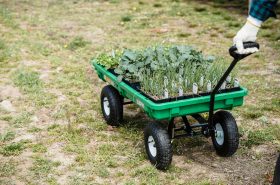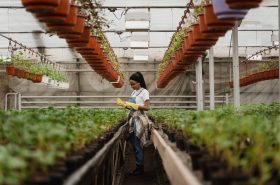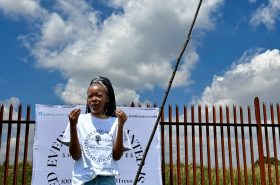Written by: Christina Vestey
“Climate change isn’t just an environmental issue. More than anything, it’s a people issue.” These are the words of Yasmine Luhandjula, a human rights lawyer coordinating Al Gore’s Climate Reality Project Campaigns in Africa. She stands alongside a growing number of voices worldwide, advocating for governments to address climate change as a human rights issue. It is a long time coming as we witness the beginnings of a human catastrophe of an unprecedented scale. If we listen to Philip Alston, UN special rapporteur on extreme poverty and human rights. He would go as far as to say, ‘human rights might not survive the coming upheaval […] We risk a ‘climate apartheid’ scenario where the wealthy pay to escape overheating, hunger, and conflict while the rest of the world is left to suffer.”
He cites a World Bank estimate that climate change could push at least another120 million people into poverty globally by 2030 unless governments take immediate action. Alston acknowledges the UN’s shortcomings and its failure to emphasise the climate crisis as a human rights issue. Once again, it has taken youth worldwide to bring human rights centre stage to the climate crisis.
As Yasmine says, “the impacts of climate change on human rights laws or just human rights violations is multidisciplinary. It impacts almost every single internationally known human rights violation, from the rights to food to the right to water, to the right to equality, to the right to vote. Even the right to life. Climate change will seep its way in, almost everywhere.” Born in the Democratic Republic of Congo, it is evident to Yasmine, “that environmental degradation is equal to somebody not having the opportunity to drink water or have access to food, or somebody not being able to go to school or having more health issues.”
Her research into government policies revealed that international policies or laws negotiated by states on climate change did not even mention the words ‘human rights’, let alone the impact on human rights.” It’s obvious, but for some reason, our leaders lack the ability to make that link. It was very frightening to see.” The Paris Agreement of 2015 only mentions human rights in its preamble. As she points out, “a lot of lawyers would argue that it’s not even in the working provisions of the agreement.”
Yasmine sees the tide is now turning, and the conscious avoidance of international governments and communities to address climate change as a human rights issue is being challenged. She believes “climate litigation and the law, in general, has the potential to shift things and to hold governments accountable.” She is not alone. Most recently, a group of six Portuguese young adults filed a landmark suit at the European Human Rights Court against 33 European Countries claiming government inaction on climate change jeopardizes their future. The court’s decision has the potential to herald a new dawn in global policy, challenging governments to implement strategies to mitigate the impact of climate change and to preserve peoples’ fundamental human rights.
Cases have been filed against governments before with mixed success. As she points out, “Carbon majors and governments are usually the main defendants in climate litigation procedures. They are extremely influential and have the resources to influence the progression of a climate change case” However, Yasmine passionately believes that the one thing that can drive climate litigation is unity among people. If people unify, if people are resilient, something will come about. If people continuously keep pushing, it strengthens their position in climate litigation procedures.”
Unfortunately, Yasmine sees most climate litigation procedures happening outside of Africa. It is her dream, “to lead a case to a the Human Rights Commission or the International Court of Justice on some of the major issues that are taking place in our continent, in Africa.” She sees a lack of unity amongst governments on the continent has led to their failure to hold the West accountable for being the most significant contributor to the world’s carbon emissions and, consequently, responsible for climate change’s devastating impacts on the continent. She believes this lack of unity “can only change if our governments change. And we’re the ones who have to keep reminding our governments that they need to change. There is a need for behavioral change and economic change.
They need to step up because climate change is disproportionately affecting the poor.” Climate scientists acknowledge that Africa is and will continue to be the hardest hit by the impact of climate change. The continent’s contribution to global greenhouse emissions is small (about 4 percent of the world’s total in 2017), Yet African nations are among the countries most vulnerable to and least prepared for climate change.* In Alston’s UN report, he criticises the “patently inadequate” step taken by the UN itself, countries, NGOs, and businesses condemning their actions for being “entirely disproportionate to the urgency and magnitude of the threat.”**
It begs the question, why are there so few African voices being heard on the global stage regarding the climate crisis? As Yasmine says.” There are many African climate activists, but many do not have the global platform to access the relevant audience. Because climate change is a global crisis, it requires unified solutions from all corners of the world. This unity will strengthen the response to the crisis, and it will protect those who are and will be most affected by climate change impacts. The solution requires the rise of African voices that are unheard in the climate change energy space, climate youth space, climate change policy space as well as the space for those fighting for the rights of indigenous communities.
As a climate change activist and human rights defender, Yasmine wants,” to create platforms and spaces to encourage and increase the rise of these unheard voices.» Her work at Climate Reality Project and her research as a human rights lawyer has highlighted this disturbing reality. “There are not many women of colour that are the face or the representative of sustainable living or even people of colour that are the face or the representatives of climate and human rights issues. There are not a lot of people that I can look up to that look like me.” She is determined to be that face for young women of colour and not only in the arena of human rights. She is equally passionate about sustainable fashion.
Fashion is her first love, and she has her own YouTube channel on sustainable fashion. It is a topic that comes with its challenges, particularly as she advocates for wearing second-hand clothes, which for many, is a cultural taboo. Despite this, she says, “You can look amazing wearing someone else’s clothes, and you can save so much money, give back to the community by selling some of your clothes and also buy clothes from Instagram shops.” It has not been an easy road to convince family and friends of the merits of second-hand clothes. “There was so much controversy around that. People were asking me questions like ‘Yasmine, why are you doing that? It’s not clean. But, I bring about this awareness and say, The global fashion industry (fast fashion) emits large amounts of CO2 yearly. This contributes towards climate change and everything that comes with that.
Many clothes are petroleum-based and made from fossil fuels, additionally, the manufacturing of these clothes requires significantly more energy and more water which therefore, encourages the cycle of anthropocentric climate change. Sustainable fashion is the opposite of that! By supporting fast fashion we are contributing towards damaging our planet and everything in it. This is why we need to recognize the impact of our buying decisions as an environmental and human responsibility that could greatly affect the future of our planet. I started a YouTube channel to raise awareness about second hand clothing as a practice of sustainable fashion. Investing in second hand clothing is not very popular in Africa, however, it is one of the most substantial forms of climate action that anyone can take. I want to use my channel to make that clear, and to make it clear that you can look amazing with second hand clothing.”
Yasmine’s in-depth understanding of challenges facing humanity due to climate change and how global economic systems are exacerbating poverty makes her an important voice to engage youth across Africa and beyond in the fight against the climate crisis. It is time we all listen to the voices of Africa. Subscribe to Yasmine’s YouTube channel Yasmine Bloom https://www.youtube.com/watch?v=Oa4HhWCI0ZA
*https://www.bbc.com/news/world-africa-50726701




